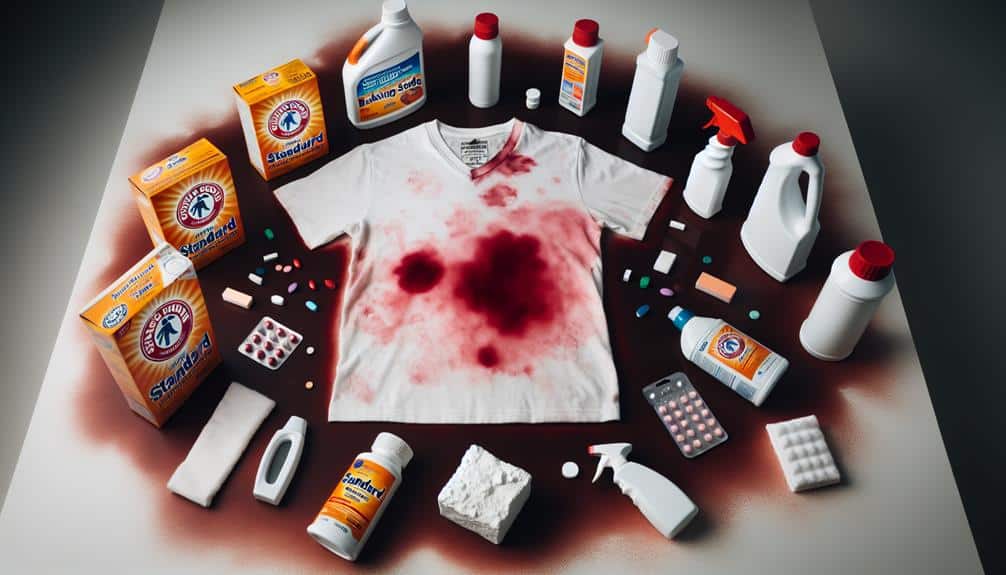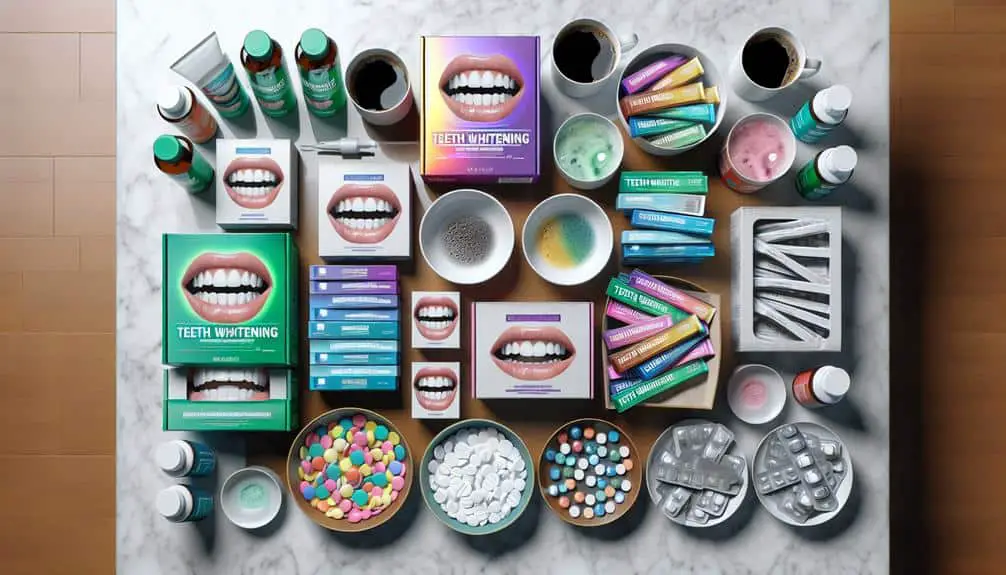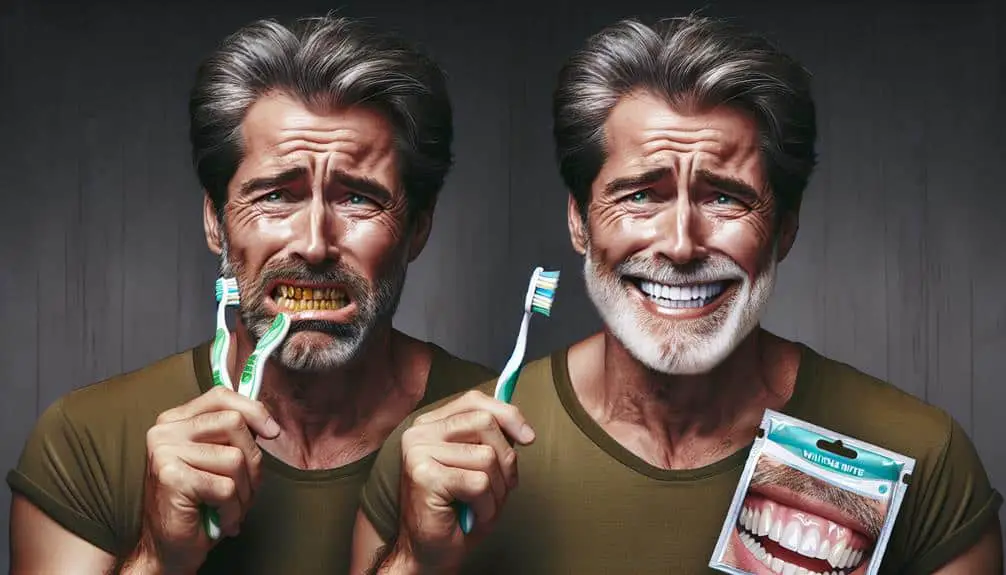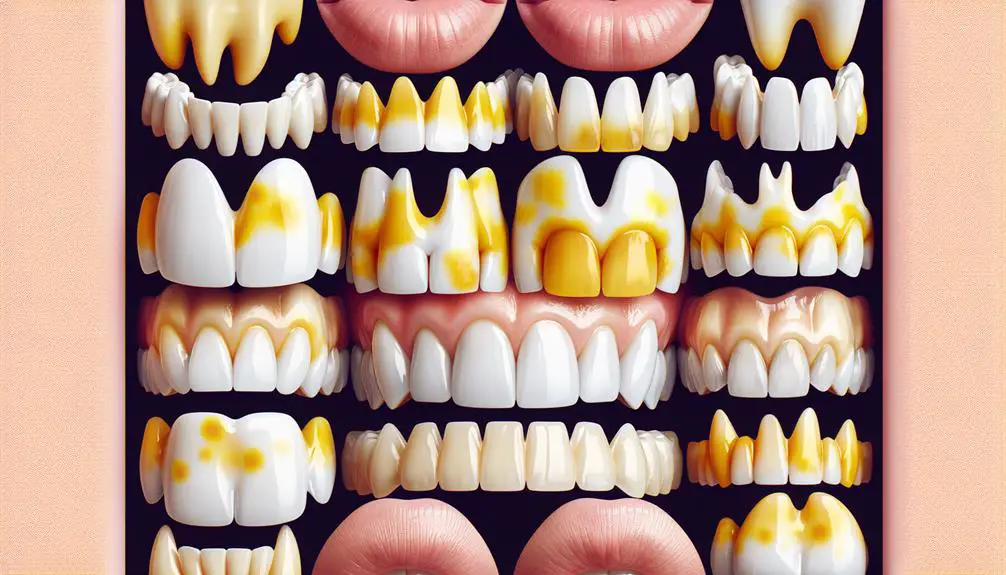To effectively remove medication stains, consider professional whitening techniques like laser treatment for precise and efficient stain removal. At-home remedies such as using baking soda or hydrogen peroxide can offer gentle solutions. Professional treatments provide immediate and noticeable results, especially for tough stains. If you have sensitive teeth, opt for gentle whitening options and consult with your dentist for suitable treatments. Maintain results by establishing a consistent oral hygiene routine and regular dental visits. Choose the best stain removal option based on your needs for a brighter smile.
Key Points
- Professional laser treatment effectively removes medication stains from teeth.
- Natural remedies like baking soda and hydrogen peroxide can help lift medication stains.
- Enamel protection during professional whitening safeguards teeth from further staining.
- Consult with a dentist for personalized recommendations on medication stain removal.
- Consistent oral hygiene and regular dental visits are crucial for maintaining stain-free teeth.
Professional Whitening Techniques
If you're looking to tackle tough medication stains, consider professional whitening techniques for effective removal. One highly effective method is laser treatment, which is performed by dental professionals. During this procedure, a specific wavelength of light is used to break down the stains on your teeth, revealing a brighter smile. Laser treatment is precise and efficient, targeting only the stained areas without affecting the surrounding enamel.
Additionally, professional whitening treatments often include enamel protection to guarantee the safety of your teeth. These treatments use specially formulated solutions that not only remove stains but also strengthen and protect the enamel. Enamel protection is vital because it helps prevent sensitivity and damage to your teeth during the whitening process.
At-Home Remedies for Stain Removal
For effective stain removal at home, consider utilizing natural remedies that are gentle yet powerful on your teeth. When dealing with medication stains, natural solutions can be quick fixes that are worth trying.
One popular method is using baking soda mixed with water to create a paste. Gently brush this paste onto your teeth, allowing it to sit for a few minutes before rinsing. Baking soda is known for its mild abrasive properties that can help lift stains from the surface of your teeth.
Another effective natural solution is hydrogen peroxide. Mix a small amount of hydrogen peroxide with water and use it as a mouthwash or apply it directly to your teeth with a cotton swab. Be cautious not to swallow the solution and rinse thoroughly after use.
These natural remedies offer a gentle approach to stain removal and can be a convenient option for those looking to brighten their smile at home.
Comparing Results: Professional Vs. DIY
When comparing the results of professional teeth stain removal to DIY methods, it's essential to take into account the effectiveness and longevity of the outcomes. Professional stain removal procedures often deliver more immediate and noticeable results compared to DIY methods. While at-home remedies can show some improvement, professional treatments are typically more effective at removing tough stains caused by medications. Regarding cost comparison, professional stain removal can be pricier upfront but may be more cost-effective in the long run due to the lasting results.
Moreover, considering time efficiency, professional stain removal procedures are usually quicker and require fewer sessions to achieve significant results compared to DIY methods. Professionals have access to specialized tools and techniques that can efficiently target and remove stubborn stains, saving you time and effort in the long term. As a result, if you prioritize effectiveness, lasting results, and time efficiency, professional stain removal may be the more suitable option despite the initial cost.
Considerations for Sensitive Teeth
Taking into account sensitive teeth when choosing professional stain removal is essential to guarantee a comfortable and effective treatment experience. If you have sensitive teeth, it's important to opt for gentle whitening products or procedures to prevent further discomfort.
When selecting a professional stain removal treatment, inquire about options specifically designed for individuals with sensitive teeth. These treatments are usually formulated to be less abrasive and contain desensitizing agents to help minimize any potential discomfort during or after the procedure.
Additionally, some professional treatments may offer customizable options to cater to sensitive teeth, such as adjusting the intensity of the whitening agents used. It's also advisable to consult with your dentist to discuss your sensitivity levels and determine the most suitable approach for your specific needs.
Maintenance Tips for Lasting Results
To maintain lasting results after professional stain removal treatment, implementing a consistent oral hygiene routine is essential. Regular brushing with a fluoride toothpaste is important for preventing new stains and maintaining the brightness of your teeth. Make sure to brush at least twice a day, especially after consuming foods or beverages known to cause staining. Additionally, consider using a whitening toothpaste to help keep your smile bright.
Apart from brushing, scheduling regular dental visits is important for long-term stain removal results. Dentists can provide professional cleanings to remove any surface stains and offer advice on how to maintain a white smile. During these visits, dentists can also monitor your oral health and address any concerns promptly.
Frequently Asked Questions
Are There Any Natural Remedies That Can Help Remove Medication Stains From Teeth?
To remove medication stains from teeth, you can try natural remedies and DIY solutions. Options like baking soda, hydrogen peroxide, and activated charcoal can help whiten teeth and reduce stains effectively. Consult your dentist for personalized recommendations.
Can Medication Stains Be Prevented With Proper Oral Hygiene Habits?
Brushing and flossing like a champ won't guarantee you a spotless smile, but those preventive habits can help keep medication stains at bay. Consider natural remedies, but always consult your dentist for professional advice.
Are There Specific Types of Medications That Are More Likely to Cause Staining on Teeth?
Certain medication types, such as antihistamines or antipsychotics, pose a higher risk of causing tooth discoloration due to their chemical composition. Understanding this medication connection can help you take proactive steps to minimize staining on your teeth.
Can Medication Stains Be a Sign of Underlying Dental Health Issues?
Exploring medication stains as a sign of deeper oral health concerns, dental check-ups reveal underlying issues. Stains from medications may hint at hidden dental problems. Seek professional guidance for thorough examination and personalized solutions.
How Can I Determine if Professional Whitening or At-Home Remedies Are the Best Option for Removing Medication Stains on My Teeth?
To determine if professional whitening or at-home remedies are best for medication stains, consider the severity of the stains and your budget. Professional whitening offers quicker and more effective results, but at-home solutions can be more cost-effective in the long run.



